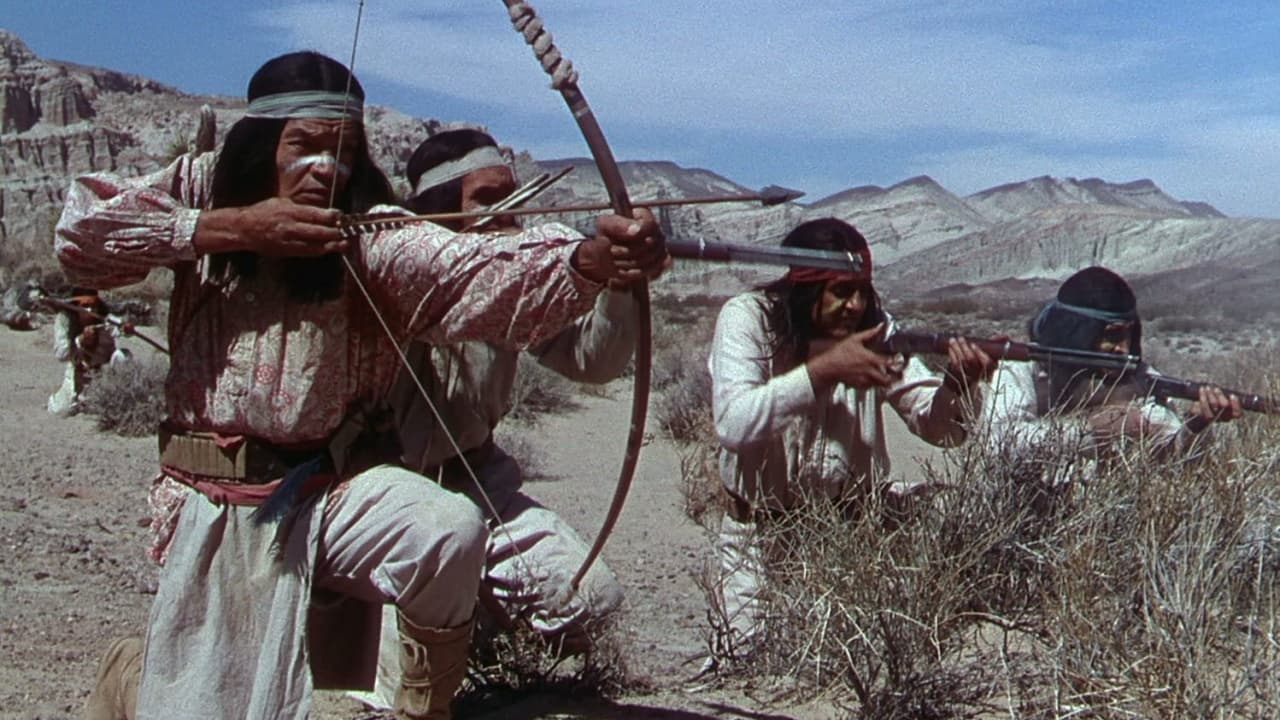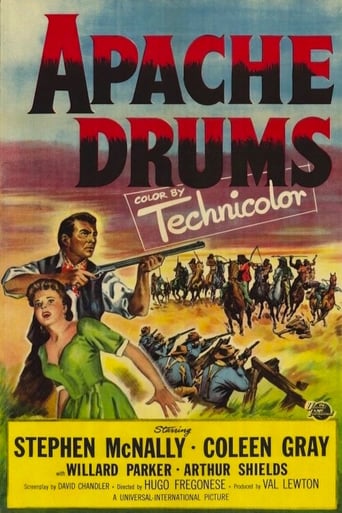

Val Lewton and Hugo Fregonese, that's quite a pair and this film makes justice to it. Fregonese directed some solid westerns like "The Raid", Blowing Wild" and "Saddle Tramp". It is hard to find a western that did not age and when looking for some aspect of it that will be cheesy, naive, improbable, deja vu,etc you will not find it. This is just the case. Stephen McNally is Sam Leeds, a gambler who loses his credibility to the town people, so when he tries to warn them about an incoming attack by the Apaches, they don't believe him. Coleen Gray is Sally, the woman he loves, but does not trust him and Willard Parker is Madden, his rival the local mayor. From the moment Leeds realizes there is going to be an attack, the film has a tense ambiance which keeps getting worse as people start dying in the church. Good cinematography by Charles P. Boyle who also did some remarkable westerns like "The Cimarron Kid" and "Horizons West".
... View MoreLike Lewton's horror films, one doesn't notice the low budget (the lowest ever for a color film at that time, per Lewton) because of the excellent character development and the plot tensions. And like his horror films, it's what you CAN'T see that's so terrifying. The final scene is in an adobe church with high, open windows. Outside one can hear the Apache drums and chants, the light from the burning town flickers on the walls, and one is forced to imagine the scene outside, as do the small band of settlers claustrophobically huddled inside. Indians appear at the windows from time to time like fun-house pop-ups. It's a nightmare situation mined for all its possibilities. Other scenes have a similar effect. A man without a gun comes on a just-massacred traveling party; suddenly, danger seems to exist all around him. Later, the hero is traveling with a party of armed men; suddenly he finds himself alone on foot on a flat plain with nowhere to take cover and a band of Apaches riding toward him at full gallop. And the opening scene: a gunfight occurs off-screen, shattering the peaceful scene of a kitten being served milk (an example of what Lewton called a "bus" scene after the sudden appearance of the bus in THE CAT PEOPLE). Though these situations may not be unique to this film, they are obviously the sort that appealed to Lewton, and are handled very effectively. But the core of the film is the characters: the protagonist, a card sharp who plays the angles (his nickname is "Slick") and is fast with a gun, a wise-ass who isn't all bad; the virtuous sheriff who isn't all good; the preacher, an old man with a lot of gumption, not a bad judge of character, but a reactionary Irish Catholic priest with a strong racial prejudice. Other typically interesting Lewton characters are the madam who's happy enough to leave town if someone will buy her out at a good price, the cavalry officer who understands the Indians, and particularly the stoic Indian scout, faithful to the settlers to the end. The very fact that these characters don't move to extremes in extreme situations, that they have both good and less positive traits, is what gives this film its grab. It's a film that doesn't force the viewer to follow its path, and doesn't automatically go to the dramatic limit suggested by the situation... That's why Lewton's films are great!
... View MoreI am surprised that no one has made the connection between a sequence in this movie and an almost identical one in the movie 'Zulu'. I have seen no connection on the IMDb site or in any movie books or trivia sites. The townsfolk are surrounded and besieged by the Apaches in a small church. After an initial assault the Apaches withdraw and begin chanting and playing their drums. The anti-hero character suggests that they sing their own song to counter this and to lift their own spirits. A large number of the men in the besieged church are Welsh miners from the town, led by the preacher character they begin singing 'Men of Harlech' in Welsh. Apart from the fact that they sing in Welsh, which I think is more accurate and actually better, this is almost directly copied for the similar sequence in the movie 'Zulu'.
... View MoreWhile not one of the greatest westerns to ever be brought to the screen, this movie does bring something else that others seemed to fail at, and that is actual human feelings and and what they went through in times of turmoil such as this film suggests. The townsfolk have to hold up in a church while outside they are attacked by Indians. In the movie it shows how the people would have and must have felt. The ending also leaves the viewer feeling pretty good. For not a very popular movie as say a John Wayne movie, this movie is actually quite good. It has yet to be released on DVD or VHS and i seriously doubt that it even has a chance yet if it was i strongly suggest western fans to grab a copy of it and see what I'm really talking about. As for those who want to see it now, your best bet is probably to try to catch it on the Western Channel although i have bee watching the channel for a few years and have yet to see it on there. The only time i ever saw it on television was on AMC, back when they had no commercials and actually played what the channel suggested, Classics.
... View More